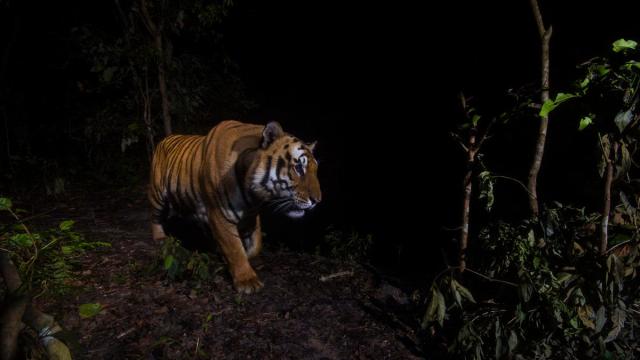The past 50 years have been a nightmare for wildlife. Globally, the recorded population sizes of mammals, fish, birds, reptiles, and amphibians decreased by an average of 68% between 1970 and 2016, the World Wildlife Fund’s (WWF) 13th annual Living Planet Report report shows. The widespread decline in species’ populations suggests a bleak future as ecosystems are pressed to the limit, but the report also shows we still have a shot to fix things.
The research is based on the WWF’s Living Planet Index, which monitors changes in a representative sample of animals on the planet which includes 4,773 species and 27,127 populations. A population is defined as a group of animals of the same species that live together in a particular area.
Because the report focuses on not only species that are at particular risk of extinction, but also those that are faring relatively well, it paints a clear picture of ecosystem health — or in this case, lack thereof for many locations across the globe.
[referenced id=”1429477″ url=”https://gizmodo.com.au/2020/09/oh-crap-major-un-climate-study-finds/” thumb=”https://gizmodo.com.au/wp-content/uploads/2020/09/10/ihyqej56zju6kehsoepl-300×169.jpg” title=”Oh Crap, Major UN Climate Study Finds” excerpt=”The United Nations (UN) has a new report out that says what many of us already know in our bones: The world is on fucking fire, and it’s going to get worse unless we act.”]
“When an animal is facing extinction, when it’s on life support, it no longer plays a functional role in ecosystems,” said Rebecca Shaw, chief scientist at WWF. “When you have population declines on this level, it really raises red flags because even though the species are not all at risk of going extinct, they are declining enough that they are posing threats to the function of the ecosystems and also may be on the road to extinction.”
While this report focuses on the health of individual populations of species, the findings are in line with other bleak updates on the natural world. That includes last year’s landmark report on the extinction crisis showing up to 1 million species are at risk of being wiped out by human activity. The United Nations has also chronicled the toll of climate change on the land and oceans that sustain us and the ecosystems we depend on to survive.
Not all parts of the world are affected equally by this decline. While animal populations in Europe and Central Asia saw a comparatively “small” 24% decline on average, populations in Latin America and the Caribbean suffered with an average decline of 94%.
Globally, the types of ecosystems faring the worst are freshwater habitats. That’s due to the pressures of the climate crisis, agriculture runoff, dams, and other impacts. Shaw said the latter is happening at “an unprecedented rate” and taking a large toll on fish species. One in three freshwater species is at risk of extinction, and on average, the authors observed an 84% decline in the freshwater mammals, birds, amphibians, reptiles, and fish monitored in the Living Planet Index. That includes species like the freshwater dolphines of the Yangtze River in China, which saw said “just 50 years ago were thriving, but are now [at risk of] extinction.”
In all parts of the world, the primary driver of all of this population shrinkage is changes in land and sea use. That includes habitat loss and degradation due to agriculture, fishing, transit, development, energy production, and mining. Other culprits for this devastation include exploiting species through hunting and poaching, invasive species and disease, and the consequences of pollution. To a lesser extent, habitat destruction due to the climate crisis also played a role, but in the future, the report authors expect that role will become larger and perhaps even primary.
“These declines show that humans’ relationship with the natural world is broken,” said Shaw.
To fix this relationship, the authors call for a “New Deal for Nature and People,” which would transform all sectors of the global economy to prioritise ecosystem health. That would include making food and energy production more efficient in terms of resource and land use, limiting waste from production, considering ecosystem health in urban development, and preserving vital biodiverse lands and waters. It also includes targeted conservation efforts for species that are on the brink of extinction.
“We’ve seen that conservation efforts can work to increase populations. Tigers, for instance, saw an increase of 64% since 1970, because there’s been a real concerted effort to increase the tiger populations in the national parks in Nepal, and it’s really made a difference,” said Shaw.
But those efforts, while necessary, cannot be effective by themselves because so many species are at risk due to systemic issues. To protect species, actions need to be taken to improve the health of not just individual species, but entire ecosystems.
Though the report states that each of these drivers stems from “humanity’s influence on the decline of nature,” these systems of exploitation have negative consequences for people, too. Agribusiness, development, and energy production all harm human and non-human life alike. Reworking these sectors to stop overuse and overproduction could also provide an important opportunity to stop some of these exploitive systems. Plus, human beings depend on the worlds’ many ecosystems to provide us with clean water, clean air, pollination, flood protection, and a stable climate. So while changing everything to protect species may not be easy, it is really our only option — not only to save animals, but also to save ourselves.
